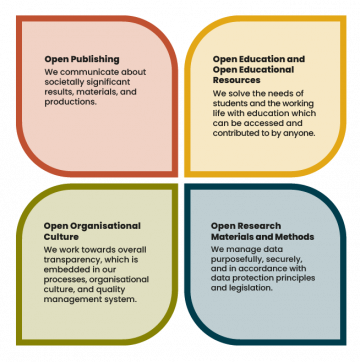
The policy of Novia University of Applied Sciences on Open Science, Education and Organisational Culture
Open science and open education concern the way publications, teaching materials, research data, and research methods can be made more accessible and useful for students, teachers, researchers, and the society. Open science and open education mean that the organisational culture is developed in collaboration with the surrounding society.
We aim to contribute to equal access to knowledge to enhance our impact on society. Novia University of Applied Sciences has committed to following national and international guidelines and recommendations regarding open and responsible research, education, and organisational culture.
Open science and open education concern everyone – our entire staff and all our students. Our open publishing channels, education, educational resources, research, development and innovation projects (RDI), as well as the most open organisational culture possible improve quality and increase our collaboration opportunities.

Policy on Open Science, Education and Organisational Culture
- Open Publishing.
- Open Education and Open Educational Resources.
- Open Research Materials and Methods.
- Open Organisational Culture.
1. Open publishing
The purpose of our publishing activity is to notify and inform the public about societally significant results, materials, and productions. We strive for everything to be published as openly as possible, both results and materials from RDI activities, as well as artistic productions, and materials for teaching. Publications refer to all publications, including artistic productions, which can be classified within the Ministry of Education and Culture’s publication types A-I. There are separate instructions and guidelines for degree theses.
We achieve this by:
- Preferring an open publication channel over a closed one, at least when it is of the same quality.
- Publishing peer-reviewed scientific publications openly with a Creative Commons license (CC) when possible. Otherwise, we require parallel publishing of a peer-reviewed manuscript version that is uploaded by the author when the publication is reported.
- Holding authors responsible for choosing open publishing channels and, if necessary, ensuring permission to parallel publish.
- Having open publishing as the starting point for our own publication series, which requires a CC-BY license or CC-BY-SA.
- For specific reasons, a more restrictive license may be allowed, and in such cases the author is responsible for handling inquiries and agreements concerning rights.
- Emphasising for openly accessible publications without delay (without embargo). We aim to publish in journals without an embargo period.
- Publishing degree theses openly in Theseus according to existing instructions.
Our staff are offered a service for parallel publishing of their publications in connection with the publication reporting. All parallel published publications and publications in our own series are preserved long-term in Theseus. The support features for our publishing activities help staff find the right type of CC license and the right method for publishing open material.
Costs for open publishing (APC, Article Processing Charge) are covered where needed, according to special conditions and application. We follow up and report transparently all APC costs to the OpenAPC-service.
The National Policy Document:
2. Open education and open educational resources
Our definition of open education is education which can be accessed and contributed to by anyone, and which is designed to meet the needs of students and the working life. Open education and open educational resources contribute to the exchange of competences and skills, increasing access to education for staff, students, and the public.
By opening our knowledge, we make our organisation visible and expand opportunities for collaboration with other organisations nationally, in the Nordic region, and internationally. New curricula are developed, and existing ones are improved in collaboration with the workforce.
We achieve this by:
- Ensuring that a significant part of our teaching and learning environment utilises and develops open education and open educational resources.
- Encouraging staff and students to create and use open educational resources, and actively participate in open education through other means.
- Ensuring that staff produced and published open educational resources are available for free use and are provided with Creative Commons licenses, while also respecting copyright, data protection, and ethical practices.
- Encouraging staff to develop and share didactic design (e.g. course plans, learning objectives, methods, and assessment criteria) that makes education more transparent.
- Meeting accessibility requirements and ensuring that content is reliable and of high quality.
- Implementing publication through platforms such as the Library for Open Educational Resources (aoe.fi) and the Hub for Flexible and Continuous Learning (opin.fi), or other established portals.
- Collaborating with the workforce to offer internships and other opportunities for students to gain practical experience.
The National Policy Document:
3. Open research material and methods
This policy component applies to all research materials and data collected, managed, and produced within our RDI activities. All data handling is primarily governed by EU legislation and national regulations. Managing data purposefully, securely, and in accordance with data protection principles enables the reuse of collected data and methods both within and outside Novia, even after projects are completed
We achieve this by:
- Ensuring that Data Management Plans (DMPs) for RDI projects are always created when justified. The RDI coordination unit provides support and offers an established DMP tool for this purpose.
- Keeping all research materials and research methods as open as possible and as closed, as necessary.
- Managing, publishing, preserving, and disposing of data in an information-safe manner based on the FAIR principles: Findable, Accessible, Interoperable, and Reusable.
- Adding metadata to research data and making it openly accessible in the Finnish FAIR data service. This enhances visibility and increases the value and impact of research results produced within RDI projects.
- Publishing, archiving, and opening research data in general or subject-specific high-quality data repositories.
- Ensuring that research infrastructures we participate in are as open as possible and as closed, as necessary. At minimum, information about terms of use should be openly available.
We secure access to services and assistance that enable proper management, storage, accessibility, and preservation of results and data. Additionally, we ensure that relevant support services are offered and further developed. We are part of the university network that collaborates with the national data center CSC (IT Center for Science), and we utilise its services whenever possible.
The National Policy Document:
4. Open organisational culture
We work towards an organisational culture based on overall transparency. The open forms of operation are an integral part of our organisational culture, and they are embedded in our quality management system and in our processes. We work openly in research, development, innovation, and education, which also include citizen science and business collaborations.
We achieve this by:
- Openly publishing and distributing produced material, methods, and productions to reach various stakeholders, including business and commercial life.
- Supporting, informing, and educating staff in open science and education, for motivating and enabling high-quality and high impact teaching and RDI activities.
- Ensuring everyone stays informed about what open science and education mean in relation to their own work.
- Emphasising individual responsibility for aligning work or studies with the university’s goals for open science, education and organisational culture.
- Considering open activities as a merit in the assessment of staff and students.
- To raise the importance and consider open organisational culture in higher regard in recruitment processes.
- Following national and international guidelines and recommendations for responsible evaluation processes.
- Promoting an open perspective in collaborative networks to increase openness and display the values of open organisational culture in our collaborative partners.
- Effectively utilising qualitative information from external sources.
- Monitoring and continuously improving organisational culture in everyday operations through assessment tools and processes.
We base the transparency in methods, materials, and quality on the principle of continuous development, the PDCA cycle (Plan-Do-Check-Act).
Staff are encouraged to register an international digital researcher ID, Open Researcher and Contributor ID (ORCID). Those who have an ORCID are expected to notify HR and include it in connection with their publications and reporting.
The National Policy Documents:
We are committed to open science, education, and operational culture by the following:
The declaration for open science and Research 2020 – 2025
Coalition for Advancing Research Assessment
Finnish National Board on Research Integrity’s (TENK) directions Responsible Conduct of Research
Agenda 2030, Goal 17: Partnerships for the Goals
We cooperate and share information about science, technologies, and innovations in accordance with the principles of open science and education.
Novia UAS has selected seven of The United Nations United Nations Sustainable Development Goals that we particularly focus on. Goal 17, Partnerships for the Goals is one of our selected goals, for more information visit our website.
